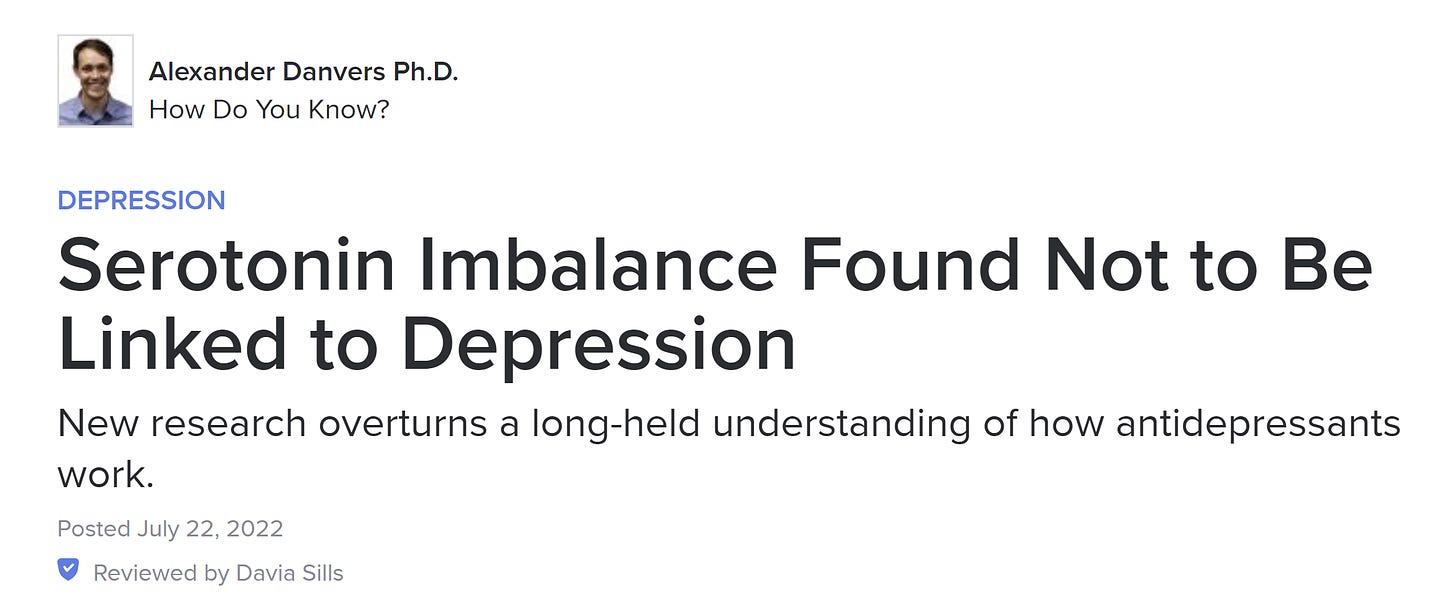No, We Have Not Proven That There is No Neurological or Physiological Influence on Depression
disproving the serotonergic theory does nothing to deny neurological origins
A big meta-analysis has provided even more evidence against the serotonergic theory of clinical depression - that those who suffer from it have insufficient or imbalanced serotonin levels and this causes the condition. This finding has been the result of a great deal of ballyhoo, but I don’t really understand why; this theory has been declared dead many times before. Unfortunately, given the way digital media and social media work, we’re seeing many people taking the ball and running with it in an unjustifiable direction: that the seeming death of the serotonergic explanation means that we know that there is no defect of the brain that influences clinical depression. And we absolutely do not know any such thing.
Here’s an example of a responsible headline, from Psychology Today:
That is an accurate one-sentence synopsis of what the study found. Here is an inaccurate and quite misleading headline from the Hill:
The fact that the story of serotonin and depression that was promulgated in the 1990s is likely false does not at all imply that there is no chemical/neurological/physiological element to depression! Unfortunately a quick perusal of Facebook for the past several days has shown me hundreds of people responding to coverage like this with total certainty that it has spelled the death knell for any pharmacological treatments of depression specifically or mental illness generally, and has played right into the hands of some bad actors. Social media is aflame with people declaring that not just depression but all mental illness have no neurological cause. That's irresponsible and could cause real damage, especially because so many are using that idea as fodder for a “suck it up and stop whining” response, to say nothing of Scientologists and other anti-psychiatry cultists. We’re also getting the same usual volley of the “mental illness is just capitalism” idiocy that I recently complained about, which leaves me with the same question: we all live under capitalism, but a small fraction of us suffer from clinical depression. That seems like a serious problem for this analysis.
I am particularly confused by those who insist that depression can’t be neurologically mediated but instead stems from trauma and stress. Why on earth would those things be in conflict? Isn’t it very likely that trauma and stress play a role in shaping our brains? And why do so many children of privilege who have not suffered major trauma nevertheless develop serious depression?
Here’s the major point: absence of evidence is not evidence of absence. The fact that, right now, we can’t prove a link between particular neurological conditions and various mental disorders does not in any way prove that no such links exist. Yes, the simplistic serotonin explanation appears to be wrong. But saying that this fact means there is no connection between depression and the brain is like saying that disproving humours theory meant that there was no connection between physical illness and the body. The truth is that we know depressingly little about the brain, even after better than a century of modern scientific research into it. We absolutely cannot say with anything like scientific rigor that mood disorders and other mental conditions do not have a neurochemical basis, and it’s beyond irresponsible that so many people with large audiences are speaking with such casual ignorance about this topic.
I’ve met plenty of people who were critical of “chemical imbalance” theory of depression who have been thoughtful and compassionate. But I have never met someone who was deeply animated against that theory, who was loud and dismissive and insistent about it, whose views on mental illness were serious and humane. I have never met someone who would leap at every chance to say that depression lies within the agency of the individual who was simultaneously compassionate towards those with depression. A significant majority of them have been outright cranks, anti-psychiatry cultists who were also skeptical of vaccines and GMOs. These are the people who have told me to treat my bipolar disorder by getting more vitamin C, doing yoga, or through prayer. And if you are one of the thoughtful and compassionate people who denies any role played by the brain (and yes, its chemistry) in depression, I would like for you to take a little time to think about who your fellow travelers are, and to see if you can’t distance yourself from the witless conspiracism and casual disrespect of that lot. Take care with who you break bread with.
I am again left with the same basic question: why are so many people who do not suffer from mental illnesses or work with them professionally, both left and right-wing, so deeply eager to deny the physiological basis of mental illness and the efficacy of psychiatric medication. It’s one of the few elements of modern society that has true cross-ideological appeal, and the attitude tends to be reflexive and thoughtless and aggressive. And I will never understand why so many people have such an intense desire to decide that mental illness is all mind, no brain, and that the drugs that treat it are necessarily bad. I will never understand it.
We haven’t found the origins of depression yet. So we’ll keep looking.
Update: Please consider this excellent piece by Paul Logan.







I don’t know why people jump from “no evidence that depression is caused by serotonin imbalance” to “SSRI’s don’t work.”
My anxiety isn’t caused by “not enough Xanax in my brain” but nobody questions that benzos calm you down.
It’s completely possible that the cause of depression is not low serotonin, and that SSRIs are an effective treatment.
Yet again i am forced to say that "I myself would not say X" is not an argument that "no one is saying X"